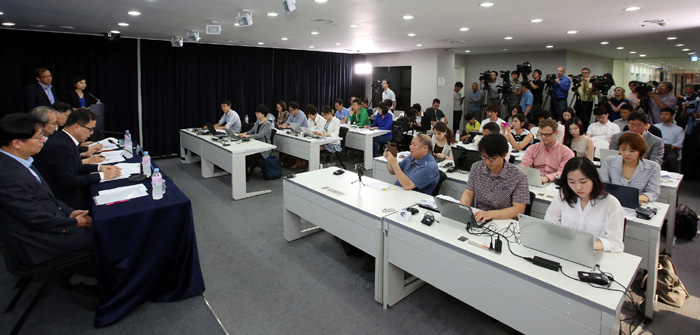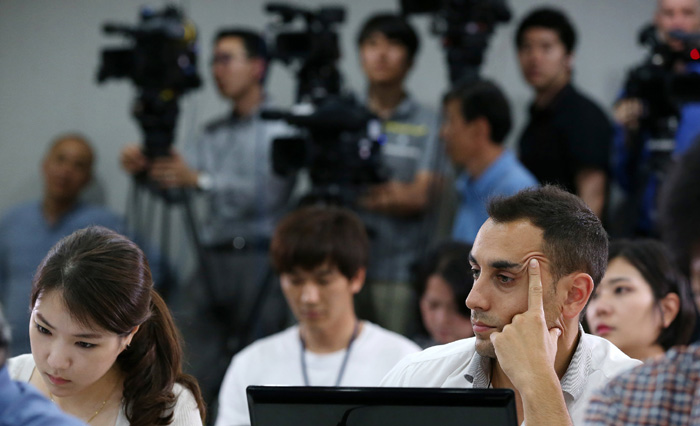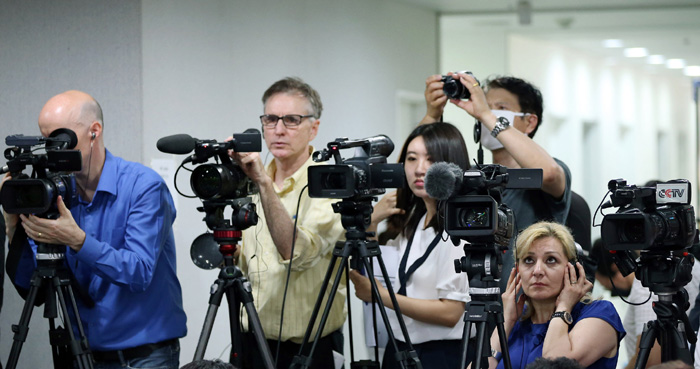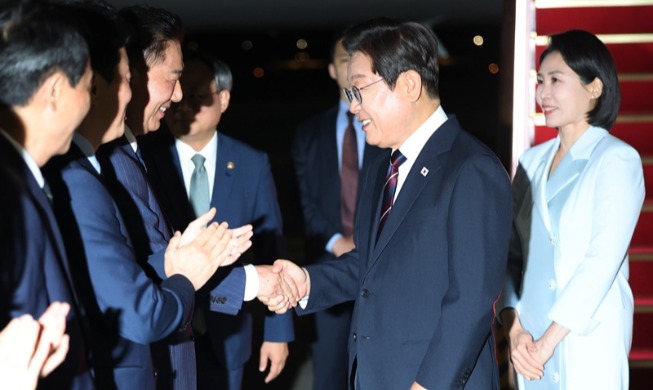
Second Vice Minister of Culture, Sports and Tourism Kim Chong and other government officials explain the Korean government’s policy measures to handle the MERS virus on June 15 in Seoul.
“Korea is safe. You can enjoy your daily routine, traveling and going shopping, too.”
The Second Vice Minister of Culture, Sports and Tourism (MCST) Kim Chong was speaking during a press briefing for foreign correspondents on the government’s policy to tackle the Middle East respiratory syndrome (MERS), at the Foreign Press Center Korea in Seoul on June 15.
“Most of the MERS contagion cases were made within hospitals. Unless you visit a disease-related medical organization, you will be safe to travel in Korea. The disease has not spread to provincial communities, and it is in a controllable condition. The Korea-WHO joint mission has also confirmed this,” said the vice minister.

Second Vice Minister of Culture, Sports and Tourism Kim Chong (left) and Director General of Public Health Policy Kwon Jun-wook answer questions from foreign correspondents during the press briefing.
During the briefing, the government introduced policies for international tourists. Director General of Tourism Kim Chul-min of the MCST said, “The government has provided information about MERS on social networking channels and has distributed 16,000 booklets to about 2,000 branches of the Korea Tourism Organization overseas. We have also supplied personal sanitary systems, like hand sanitizers, at major tourist attractions in order to provide accurate information about the disease and the government’s policy toward it,” said Director General Kim.
In regard to interpreting services for overseas tourists, he said, “Currently, we are providing language services about MERS at the Korea Travel Phone 1330 in four languages, around the clock.”
“In order to create a safe environment for tourism, the government has been carrying out measures such as developing a special tourism package with safety insurance. In case overseas tourists are confirmed with MERS, we will do everything for them so that they can receive the same, swift treatment as that of Korean nationals,” said Kim.

Kim Woo-joo, leader of the government’s MERS Response Task Force, explains the current MERS situation in Korea.
When asked about the ratio of non-Koreans among MERS patients here, Director General of Public Health Policy Kwon Jun-wook of the Ministry of Health and Welfare said, “There are currently no non-Koreans among the MERS patients. As most of the spread of MERS was caused within hospitals, we assume there will be no cases of MERS among overseas tourists. Just in case it happens, by any chance, the government will do everything for them, just the same as we do for Korean nationals.”
In regard to the estimated end of the MERS outbreak, Kim Woo-joo, leader of the government's MERS Response Task Force said, “The longest incubation period of MERS is 14 days. Three hospitals among the 12 hospitals on the government’s watch-list are exempt from the list, as there have been no MERS patients reported there. So we have only nine hospitals now. If no additional MERS cases are reported from each of these hospitals over the next 14 days, June 27 will be the last date of this MERS outbreak. At the moment, we are trying to prevent any new 'super spreaders,' people who spread the virus to many other people.”
Article by Yoon Sojung
Photo: Jeon Han
Korea.net Staff Writers
arete@ korea.kr


Journalists attend a press briefing on MERS.
Most popular
- Military discharge sets stage for reunion of all 7 BTS members
- 'We are back!' BTS Festa heralds hyped return of K-pop phenom
- Presidents Lee, Trump discuss tariff deal in first phone talks
- President Lee leaves for G7 Summit in Canada on first int'l trip
- K-pop streaming on Spotify skyrockets 470-fold in 10 years
